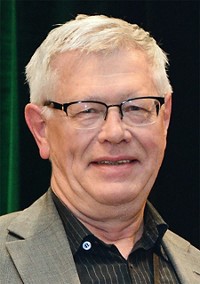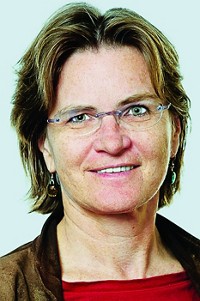Advertisement
Grab your lab coat. Let's get started
Welcome!
Welcome!
Create an account below to get 6 C&EN articles per month, receive newsletters and more - all free.
It seems this is your first time logging in online. Please enter the following information to continue.
As an ACS member you automatically get access to this site. All we need is few more details to create your reading experience.
Not you? Sign in with a different account.
Not you? Sign in with a different account.
ERROR 1
ERROR 1
ERROR 2
ERROR 2
ERROR 2
ERROR 2
ERROR 2
Password and Confirm password must match.
If you have an ACS member number, please enter it here so we can link this account to your membership. (optional)
ERROR 2
ACS values your privacy. By submitting your information, you are gaining access to C&EN and subscribing to our weekly newsletter. We use the information you provide to make your reading experience better, and we will never sell your data to third party members.
People
George A. Olah Award In Hydrocarbon Or Petroleum Chemistry
by Mitch Jacoby
January 19, 2015
| A version of this story appeared in
Volume 93, Issue 3
Sponsored by the George A. Olah Award Endowment
For the past 30 years, Jingguang G. Chen, the Thayer Lindsley Professor of Chemical Engineering at Columbia University, has worked to uncover hidden details at the core of catalytic surface chemistry. The breadth of his contributions leads catalysis experts in academia and industry alike to categorize Chen as a world leader in experimental and theoretical studies of carbide and bimetallic catalysts.
Through a series of investigations, Chen’s group demonstrated that low-cost transition-metal carbides can function as active catalysts that selectively transform hydrocarbons and oxygen-containing organic molecules. These studies, which the group extended to electrocatalysis, grabbed the attention of the catalysis community because such transformations are typically mediated by platinum and other precious-metal catalysts.
In one study in this area, Chen’s group showed that tungsten carbide capped with a minuscule quantity of platinum catalyzes evolution of hydrogen from water nearly as effectively as pure platinum does. The work suggested cost-saving strategies for producing and using hydrogen in environmentally benign ways. Subsequently, the group identified methods for using carbide catalysts to react CO2 with hydrogen to produce valuable products.
In related work, Chen and coworkers applied theoretical and experimental methods to reveal hidden connections between electronic and catalytic properties of bimetallic (alloy) catalysts. The team then used those correlations to design thin-film alloy catalysts and showed that they outperform thick catalysts composed of either metal alone.
In one study of this type, the group demonstrated the enhanced selectivity in hydrocarbon reactions afforded by platinum coated with just a single atomic layer of nickel. Alloy catalysts had been studied for years prior to this work. But such catalysts typically were prepared on a trial-and-error basis.
As an undergraduate student at Nanjing University, in China, Chen, now 53, majored in chemistry. Upon graduating in 1982, he went to the University of Pittsburgh, where he earned a Ph.D. degree in 1988 working with noted surface chemist John T. Yates Jr. He then served as an Alexander von Humboldt Postdoctoral Fellow at the Jülich Research Center, in Germany, before accepting a position as a staff scientist at Exxon’s corporate research laboratory, in Annandale, N.J.
After nine years of industry research, Chen began an academic career in 1998 at the University of Delaware, where he served in several capacities including professor of chemical engineering, materials science and engineering, and chemistry, and director of Delaware’s Center for Catalytic Science & Technology. Since 2012, Chen has served as a professor of chemical engineering at Columbia University and as a staff scientist at Brookhaven National Laboratory.
Chen is editor of Applied Surface Science and has served on the editorial boards of several scholarly journals including Surface Science, Langmuir, and Surface Science Reports. He is the recipient of several awards and accolades. For example, he is a fellow of the American Chemical Society and of the American Vacuum Society, and he was honored with the Herman Pines Award in Catalysis by the Chicago Catalysis Club and the Excellence in Catalysis Award by the New York Catalysis Society. Chen has published some 300 scientific articles and holds 20 U.S. patents.
Chen will present his award address before the Division of Catalysis Science & Technology.





Join the conversation
Contact the reporter
Submit a Letter to the Editor for publication
Engage with us on Twitter